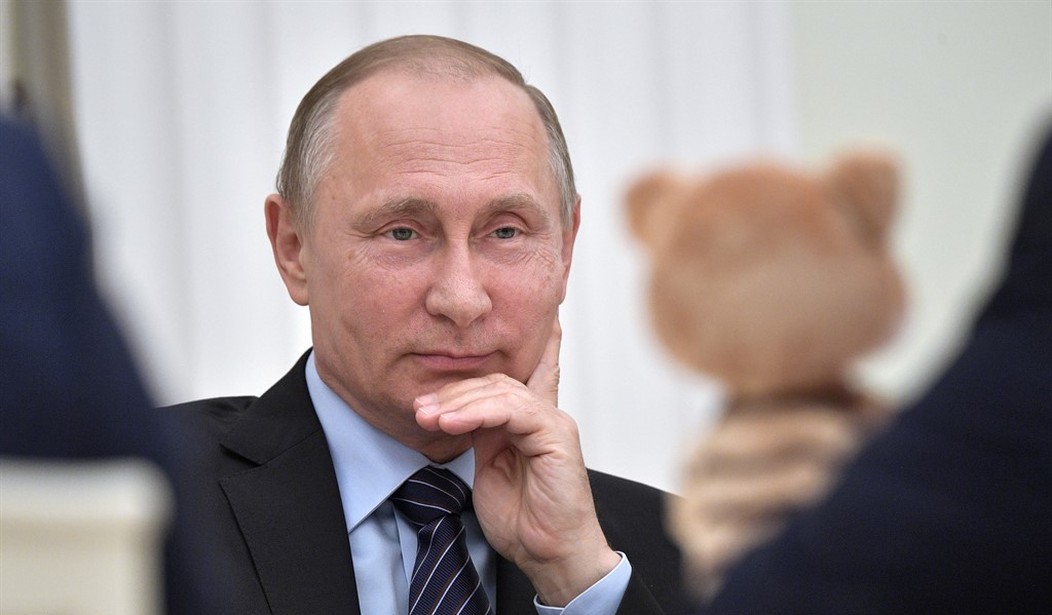B-b-b-but … what about Seth Rich?
This is basically Putin’s version of the O.J. “If I Did It” book.
Mr. Putin’s comments, made during a meeting with Russian and foreign news agencies in St. Petersburg, were a departure from the Kremlin’s previous position: that Russia had played no role whatsoever in the hacking of the Democratic National Committee and that, after Mr. Trump’s victory, the country had become the victim of anti-Russia hysteria among crestfallen Democrats.
Raising the possibility of attacks by what he portrayed as free-spirited Russian patriots, Mr. Putin said that hackers “are like artists” who choose their targets depending how they feel “when they wake up in the morning.”
“If they are patriotically minded, they start making their contributions — which are right, from their point of view — to the fight against those who say bad things about Russia,” he added.
“We’re not doing this on the state level,” Putin reiterated, while O.J. continued to search for the real killer. The “Russian patriot” excuse is the same one he used to deny Russian military operations in Ukraine when war broke out there in 2014. Well-equipped, uniformed troops — sans insignia — started showing up inside the country. Russian soldiers? Nope, Putin claimed, just “separatists” who supported reunification with the motherland. It wasn’t until December 2015 that he ‘fessed up. Now he’s opening the door to the possibility that Russians were in fact involved in the DNC and Podesta hackings. How come?
It’s possible that he’s telling the truth — technically. The guilty parties might not be formally employed by the state but rather black-hat hackers with a relationship to Russian intelligence. That wasn’t the conclusion of U.S. intelligence, though. DNI blamed Russia’s GRU, i.e., military intelligence, for the DNC hacking and accused them of using Guccifer 2.0 and Wikileaks to publish the material. A senior U.S. intelligence official told NBC in early January that the U.S. knew the names of the Russians who handed off the hacked emails to Wikileaks. Other intelligence sources told the network in December with a “high level of confidence” that Putin was personally involved in the hacking campaign. Which makes sense: Russian intel might normally allow black-hat hackers to operate with some degree of freedom but screwing around with America’s presidential campaign could result in all sorts of blowback for the country. Imagine some Russian 20-year-old deciding on his own that it’d be fun to mess with the DNC, then suddenly the hacking operation is exposed and Hillary wins the election anyway, leaving Putin to face the wrath of the new White House. “Patriotically minded freelancers” wouldn’t risk pissing him off by spearheading an operation as risky as that on their own initiative. They might end up dead if they did.
Why is Putin opening the door to Russian involvement now after denying it for so many months? The easy answer is that he’s doing what he usually does, trying to mess with people’s heads in the west by gaslighting them about their own institutions. Trump has spent months questioning whether Russia was really behind the campaign hacks; lately, thanks to Sean Hannity, righty populists have seized on Seth Rich as an alternative suspect — with encouragement from Russia itself. Now here’s Putin suddenly hinting that maybe Russians did it after all. It keeps the bitter “whodunnit?”/collusion free-for-all among American partisans going, never mind that the NSA, CIA, and FBI agreed months ago that Russian intelligence was responsible. Just two days ago, in fact, Putin went the other way by parroting Trump’s line that the entire idea of Russian meddling in the campaign is a fiction concocted by Democrats to excuse Hillary’s defeat. He’s playing both sides. What’s strange, though, is that he’s doing it at a moment when the U.S. and Russia are chatting about concessions, starting with returning the spy compounds in New York and Maryland to the Russian government. Why would he hint at Russian culpability in the hackings at a moment like that? Is he trying to squeeze Trump by suggesting that he might admit the whole thing was a Russian intelligence operation designed to help Trump win if the White House doesn’t play ball? Once he makes that move, further cooperation with Russia by Team Trump will be completely politically radioactive.
In lieu of an exit question, read this short but essential piece on how freely Russian spies have been operating within the United States over the past 15 years. The FBI keeps finding Russian diplomats wandering around strange places in the middle of nowhere — all of which just so happen to be near where underground fiber-optic cables run. The leading theory right now is that Russia is systematically mapping America’s telecom infrastructure, with little interference. But that’s not all:
Most U.S. intelligence officials can relay stories of run-ins with Russian intelligence operatives — often moonlighting as lobbyists, diplomats and businessmen — hanging around popular Washington happy hours. It’s an open assumption that they use Capitol Hill and its public office buildings as a farming ground for potential recruits. And the presumed agents aren’t hard to spot, according to officials: An oft-traded joke is to go to one of Washington’s handful of Russian restaurants and look for the guy in a tracksuit.
In Russia, counterespionage sometimes involves ambushing and beating CIA officials in the street. In America, the tracksuit guys are waiting around to chat with you about exciting opportunities. How come Barack Obama, scourge of Russian meddling in U.S. affairs, didn’t do anything about that?








Join the conversation as a VIP Member